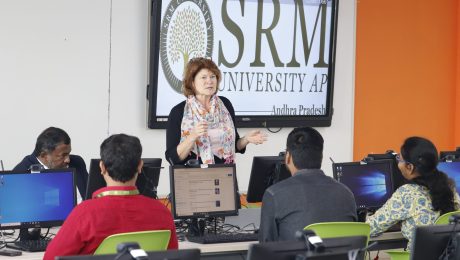Third year CSE students innovate efficient plastic recycling technology
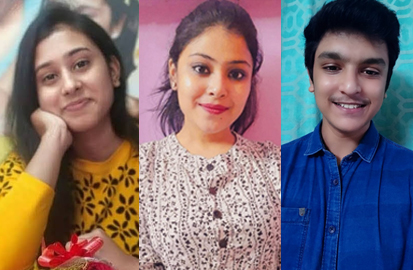 Swikriti Khadke, Pragya Gupta, and Shanmukh Rachakunta from third-year Computer Science Engineering have published a research paper titled “Efficient Plastic Recycling and Remold Circular Economy using the Technology of Trust – Blockchain” along with their mentors from SRM University-AP Dr Jatindra Kumar Dash, Dr Goutam Kumar Dalapati and Dr Sabyasachi Chakrabortty in the peer-reviewed journal Sustainability.
Swikriti Khadke, Pragya Gupta, and Shanmukh Rachakunta from third-year Computer Science Engineering have published a research paper titled “Efficient Plastic Recycling and Remold Circular Economy using the Technology of Trust – Blockchain” along with their mentors from SRM University-AP Dr Jatindra Kumar Dash, Dr Goutam Kumar Dalapati and Dr Sabyasachi Chakrabortty in the peer-reviewed journal Sustainability.
Global plastic waste is increasing rapidly. The strategic management of plastic waste and recycling can preserve environmental species and associated costs. The utilization of plastic can be done by introducing Blockchain during plastic waste recycling. Automation for the segregation and collection of plastic waste can effectively establish a globally recognizable tool using Blockchain-based applications. Collection and sorting of plastic recycling are feasible by keeping track of plastic with unique codes or digital badges throughout the supply chain. Efficient recycling technology is essential to reduce plastic pollution. Many technologies have been employed to enhance plastic recycling. Among them, blockchain is promising for plastic recycling and circular economy (CE). Blockchain, a distributed ledger, consists of some ordered blocks which are unchangeable. This can be considered an exemplary way to push the transactions of their customers under the same blockchain technology. The research group used machine learning techniques to predict plastic generation globally so that they could see the impact it will make in the coming future. The students have used ARIMA – Auto-Regressive Integrated Moving Average for the study.
The potential idea is to utilize an approach wherein recyclers can keep track of generated waste as it moves through the various chains. A platform that works by tracking recycling activities across a local recycling supply chain on the Blockchain. When this will be publicly available, consumers can also use the ledger info to make more informed purchasing decisions. The Blockchain can be utilized to track individual items through the recycling supply chain by creating physical markers like QR codes.
The suggested Blockchain-based platform can be implemented in various nations with an autonomous waste collector and storage system. This process can be expanded to individual collectors and storage systems. The novel process will be created by incorporating a reward-based Blockchain scheme with the collaboration of global businesses and local waste collectors. The proposed model further allows the effective sharing of databases among various supply chains to create a CE.
Talking about the social implications of the research, the students firmly believe that the study will result in the introduction of new technology in the recycling industry and promote awareness about technology in rural areas. Developing a platform and implementing blockchain and other facilities will be the focus of these young innovative brains of SRM University-AP in the forthcoming days.
Read the full paper here: https://doi.org/10.3390/su13169142
- Published in Chemistry-news, Computer Science News, Departmental News, News, Physics News, Research News
The Narasimhan-Seshadri theorem and some of its ramifications
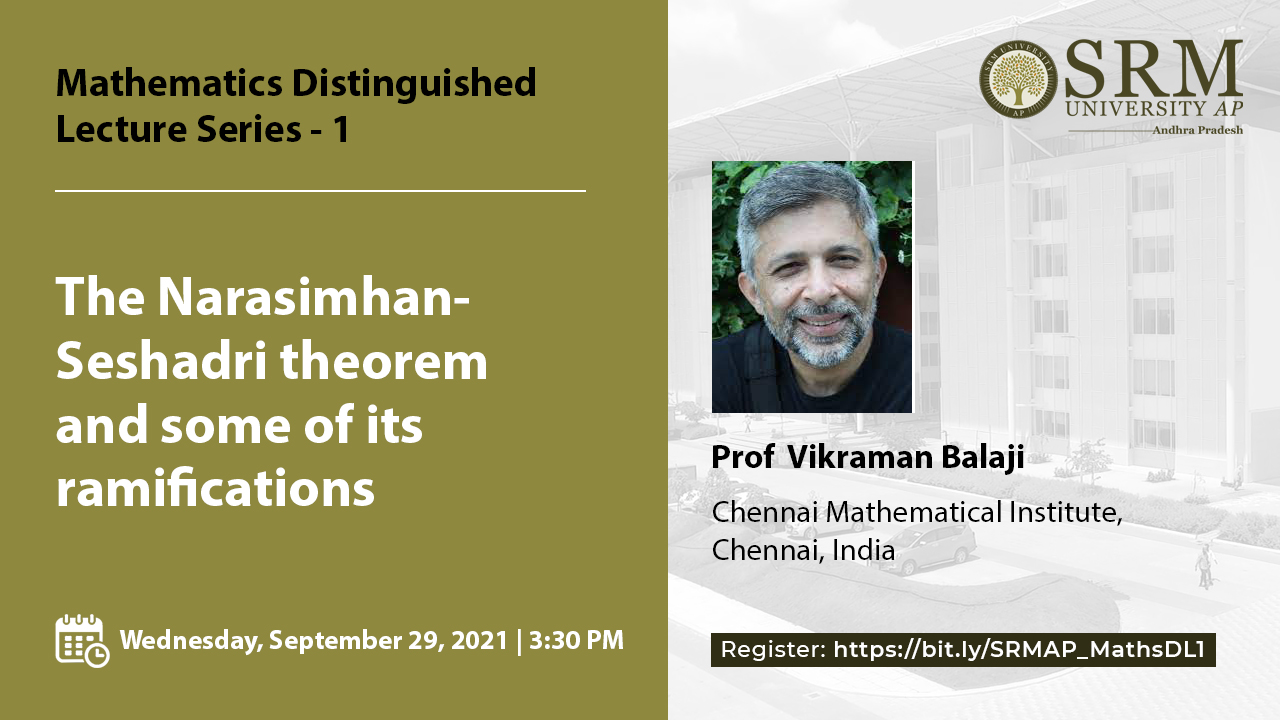 The Department of Mathematics at SRM University-AP organises the first episode of the Distinguished Lecture Series on September 29, 2021, at 3:30 pm. Prof Vikraman Balaji, renowned Mathematician from Chennai Mathematical Institute, Chennai, India will deliver a lecture on the topic “The Narasimhan-Seshadri theorem and some of its ramifications”
The Department of Mathematics at SRM University-AP organises the first episode of the Distinguished Lecture Series on September 29, 2021, at 3:30 pm. Prof Vikraman Balaji, renowned Mathematician from Chennai Mathematical Institute, Chennai, India will deliver a lecture on the topic “The Narasimhan-Seshadri theorem and some of its ramifications”
Abstract of the talk:
The Narasimhan-Seshadri theorem is one of the spectacular theorems from India in the past 50 years or so. The theorem is more than a deep result but is in a way philosophy or correspondences and symmetries. The theorem has had an impact on several aspects of mathematics. The theorem has also led to developments along lines that are similar but by themselves are also deep and central. Since the talk is for a general audience, I plan to give an overview of the theorem, a few of its big impacts in topology and geometry and a few of its ramifications in terms of generalizations.
About the Speaker:
Prof Vikraman Balaji is a renowned Indian Mathematician and currently a professor at the Chennai Mathematical Institute, India. He completed his doctorate in mathematics under the supervision of Prof C S Seshadri. His primary research area is algebraic geometry. He has made outstanding contributions to moduli problems over algebraic varieties. In particular, his work on ‘compactification of moduli of principal G-bundles over algebraic surfaces and his joint work with C.S Seshadri on ‘Parahoric torsors’ are very significant among his many other notable works. In 2006, he received the prestigious Shanti Swarup Bhatnagar Award in Mathematical Sciences and was awarded the J.C Bose fellowship in 2009. He was elected Fellow of the Indian Academy Of Sciences in 2007 and Fellow of the Indian National Science Academy (INSA) in 2015. He is presently an elected member of the National Academy Of Sciences, India (NASI).
Join this lecture on September 29, 2021, at 3.30 pm to understand the Narasimhan-Seshadri theorem and its impact on Mathematics.
- Published in Departmental Events, Events, Math Events, Webinars
Conference on Number Theory and Related Topics
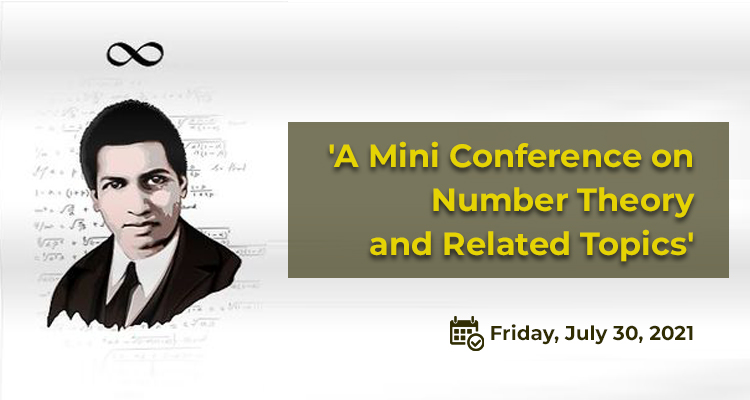 Department of Mathematics, SRM University-AP organised a 3-day conference on Number Theory and Related Topics. The Conference was scheduled for July 30 – August 01, 2021. Distinguished speakers from IMSC Chennai, CMI-Chennai, IIT-Kanpur, Ropar, Indore, Gandhinagar and Delhi, IISER-Bhopal, Pune and Tirupati, Charles University, Prague, University of Zagreb, RKMVERI, Belur took part in the Conference and presented their work and ideas on Number Theory.
Department of Mathematics, SRM University-AP organised a 3-day conference on Number Theory and Related Topics. The Conference was scheduled for July 30 – August 01, 2021. Distinguished speakers from IMSC Chennai, CMI-Chennai, IIT-Kanpur, Ropar, Indore, Gandhinagar and Delhi, IISER-Bhopal, Pune and Tirupati, Charles University, Prague, University of Zagreb, RKMVERI, Belur took part in the Conference and presented their work and ideas on Number Theory.
Modern number theory is connected with almost every other branch of mathematics. This Conference is dedicated to exploring different aspects of modern number theory, including modular forms, automorphic forms, representation theory, arithmetic geometry, special functions, diophantine approximations, quadratic forms etc. This Conference aims to encourage young aspiring mathematicians to get a flavour of the broad horizon of number theory.
For more information and to watch the lecture videos, please visit this site.
Innovation in education
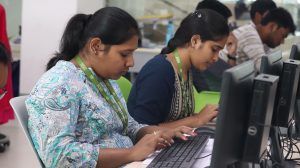
“Innovation is the only way to win,” said Steve Jobs, who certainly knew a thing or two about innovations. With Industry 4.0 and digital disruptions felt across every sector, innovation and creativity are the way forward. Institutions of higher learning that are focused on nurturing winners in varied walks of life have integrated innovation into their modes of learning, curriculum and ecosystem. And SRM University-AP has been leading the way.
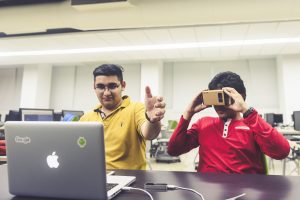 Established as a broad-based multidisciplinary research-intensive university, it has been the flagbearer for innovation in a short span of time. Of course, the unprecedented events of the past year necessitated the integration of innovation into modes of learning and classroom delivery. SRM University-AP was up to the challenge, swiftly transitioning to digital platforms, encouraging engaging pedagogies and novel assessment systems to enhance students’ learning experience.
Established as a broad-based multidisciplinary research-intensive university, it has been the flagbearer for innovation in a short span of time. Of course, the unprecedented events of the past year necessitated the integration of innovation into modes of learning and classroom delivery. SRM University-AP was up to the challenge, swiftly transitioning to digital platforms, encouraging engaging pedagogies and novel assessment systems to enhance students’ learning experience.

But the university’s truly pioneering work lies in fostering an entrepreneurial and innovation-centric aptitude amongst students. Through mentorship from faculty members and industry experts, SRM University-AP has consistently strived to inculcate the values and penchant for innovation and creative solutions amongst students. It has also instated varied clubs and initiatives that promote students pursuits based on innovation.
- The Innovation Cell at the university promotes the active participation of students in numerous activities that put innovative thinking into focus. From participation in events like Toycathon 2021 to Smart Idea contests, it is a buzzing hub of activity.
- ENNOVAB, the Entrepreneurial Innovation Lab is a student-run centre that has added a rich layer to the ecosystem at the university. It was founded by alumni of the Saturdja Center For Entrepreneurship & Technology, University of California Berkeley.
- It will also partner with SRM University-AP and Jacob Center of Design And Innovation to launch the Innovation, Design and Entrepreneurship Academy (IDEA). It will harness the culture for students of liberal arts and sciences, engineering and management.
- SRM Habitat for Research & Innovation in Science (SHRISTI) takes things a step further and has been designed to nourish young and fragile businesses through guidance and resources. It will enable students to develop their business ideas effectively.
- The university is also keen on establishing Centers of Excellence on Cloud Computing, Internet of Things (IoT), Artificial Intelligence and Machine Learning, 5G Technologies, Weather Forecast, Satellite Technology, Renewable Energy etc.
SRM University-AP has been organising seminars and conferences that speak for the values of innovation in every industry sector. Together with these centers and labs, it has thus created an environment where students can ideate, innovate, be creative, and become the changemakers of tomorrow.
- Published in Blog, Innovation
Strengthening Research Culture
“In much of society, research means to investigate something you do not know or understand. Research is creating new knowledge,” said Neil Armstrong, the first man on the moon. The quest for knowledge creation has consistently pushed researchers and scholars to seek answers to evolving questions. And if there is anything we have learned in the past year, it’s that we are often posed with new challenges that require innovative solutions in today’s world.
The new world has its eyes trained on well-trained researchers, who are problem solvers of tomorrow. Their journey begins at institutions of higher learning, which should not only imbibe research aptitude but also equip them with cutting edge skills to see their projects to logical conclusions. Looking at teaching and research as independent entities can be a considerable loss, and new-age institutions like SRM University-AP are set on avoiding it at any cost.
Research in its DNA
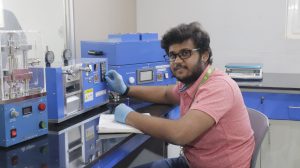 Since its inception, SRM University-AP has been known as a broad-based multidisciplinary research-intensive university. As its Pro-Vice-Chancellor Prof. D. Narayana Rao says, “SRM University-AP provides exciting and challenging research opportunities that are of national and international importance and have social applications.” True to those words, it has developed a lively ecosystem conducive to research, showing the results.
Since its inception, SRM University-AP has been known as a broad-based multidisciplinary research-intensive university. As its Pro-Vice-Chancellor Prof. D. Narayana Rao says, “SRM University-AP provides exciting and challenging research opportunities that are of national and international importance and have social applications.” True to those words, it has developed a lively ecosystem conducive to research, showing the results.
The research focus at the University had drawn around 60 scholars from around the world pursuing their PhDs in their areas of interest. In a short span of time, faculty members and students of the University have published over 200 research papers. In 2019-20 alone, eight patents were published, and 5 were applied for under SRM University-AP. The staggering amount of quality output has caught the eye of aspiring researchers and leading institutions alike.
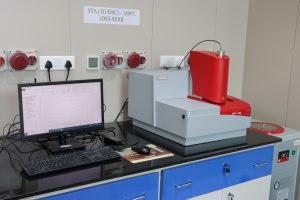
Top names like DST, DBT, BRNS, Government of India and the British Council have sanctioned 24 research projects with a total outlay of Rs. 12.00 crores to faculty members at SRM University-AP. And this seems only the beginning for scholars at the University, who are encouraged by concerted initiatives and growing infrastructure on campus, which has a thriving ecosystem for research pursuits.
- The University has drawn a dynamic pool of faculty members with international exposure. As they work on impactful research, they mentor students and scholars to think creatively and present solutions through projects.
- It is set to create Centres of Excellence on Cloud Computing, Internet of Things (IoT), Artificial Intelligence and Machine Learning, 5G Technologies, Weather Forecast, Satellite Technology, Renewable Energy, Energy Storage Devices, Additive Manufacturing, Gene Editing, and Blue Economy to embrace new technologies.
- Its international collaborations with MIT, the University of California, Berkeley and other renowned foreign universities offer students opportunities to interact with and collaborate with peers and academicians worldwide.
- SRM University-AP has also focused on industry collaborations with powerhouses like TITAN, Amara Raja Batteries Limited (ARBL) for joint research. In fact, it is working with Indian Railways to develop hydrogen-powered fuel cell-based trains.
These and other projects in the pipeline can no doubt have an impact on society. But at the same time, shaping future knowledge creators and problem solvers will be a significant achievement stemming from the research culture on the SRM University-AP campus.
Developing New Age Professionals
“Education is not the learning of facts but the training of the mind to think.” Albert Einstein
Your college years are when you learn the foundational concepts and get exposure to industry functioning through practical experiences. But in most instances, it’s also the last stage in your training before you put on the professional gloves. You are gearing up for long and successful innings in your career, and you want to start it on a solid footing. That’s why focusing on extracurricular activities during your programmes remains crucial.
The industry today is looking for a lot more from its employees than ever before. New age industry professionals need to be equipped with lateral thinking skills to arrive at solutions from diverse perspectives. They choose candidates with leadership qualities, teamwork, professionals who can think critically and out of the box. These are just some of the attributes seen in students who emphasize extracurricular activities as much as academic excellence.
New age higher learning institutions like SRM University-AP are leading the way by bridging the gap between industry demands and students’ skills set. Our programmes are designed to promote the holistic growth of students through varied extracurricular activities. Students can opt for activities that are in keeping with their interests and hone their skills. They complement your academic learning and transform you into the well-groomed professionals of tomorrow.
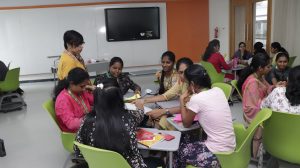 The Department of Student Affairs at SRM University-AP works closely with students, faculty members and staff to create a thriving ecosystem for holistic growth. Students are exposed to enriching experiences that boost their skills and interests through numerous clubs and societies. They also find platforms to showcase their talent and gain confidence while also learning leadership skills as they organize these events and take ownership.
The Department of Student Affairs at SRM University-AP works closely with students, faculty members and staff to create a thriving ecosystem for holistic growth. Students are exposed to enriching experiences that boost their skills and interests through numerous clubs and societies. They also find platforms to showcase their talent and gain confidence while also learning leadership skills as they organize these events and take ownership.
- Art and Culture oriented clubs focused on photography, music, dance etc., engage students in artistic pursuits. They also hone creative thinking skills, which are a tremendous value addition to the repertoire of future professionals.
- The activities of movie clubs, literary clubs are designed to engage students in discussions that offer them a broader perspective. They boost lateral thinking and offer students exposure to diverse backgrounds, cultures and more.
- Students can also participate in various sporting activities on campus. Sports Clubs not only emphasize all-around fitness but also build team spirit and leadership abilities. They boost students’ confidence to perform on bigger stages.
- SRM University-AP endeavours to shape socially conscious and responsible future professionals. Through yoga and meditation, activities of the Welfare Club, students understand the importance of leading fulfilling lives while giving back to society.
- Extracurricular activities can include everything from app development to imbibing entrepreneurship skills through specifically designed clubs. These activities build on the skills learned in the classroom and offer valuable exposure.
All extracurricular activities enhance student engagement on campus, build their organizational skills, boost confidence and transform them into leaders. These are essential skills for new age professionals, so the role of extracurricular activities in their nurturing is indispensable.
Science-Engineering-Technology synergy for sustainable growth
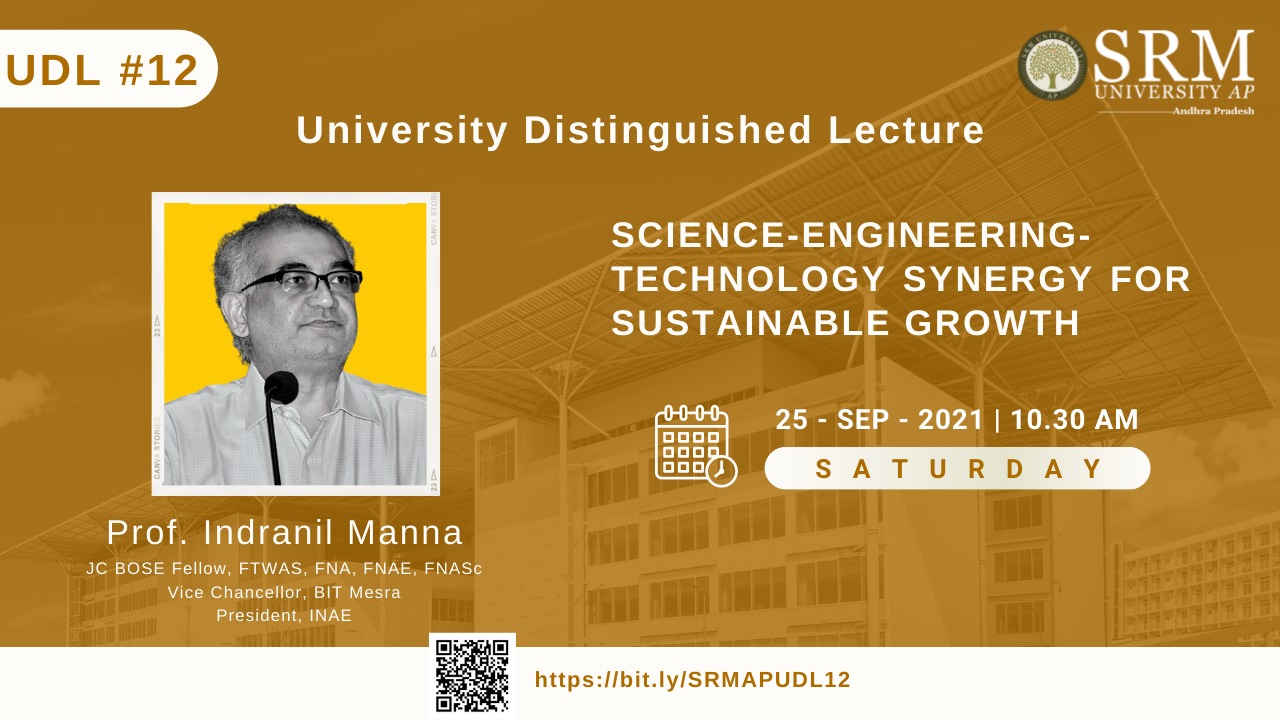 SRM University-AP, Andhra Pradesh is organising the twelfth edition of the University Distinguished Lecture Series on September 25, 2021, at 10.30 am. Professor Indranil Manna, eminent scholar and JC Bose fellow, will deliver the distinguished lecture on the topic “Science-Engineering-Technology Synergy for Sustainable Growth”.
SRM University-AP, Andhra Pradesh is organising the twelfth edition of the University Distinguished Lecture Series on September 25, 2021, at 10.30 am. Professor Indranil Manna, eminent scholar and JC Bose fellow, will deliver the distinguished lecture on the topic “Science-Engineering-Technology Synergy for Sustainable Growth”.
Sustainable development will necessitate new engineering and technology-based solutions to address the challenges of climate change, population increase, and urbanisation. Engineering infrastructure and competence-building initiatives are essential to assure that an adequate number of engineers are capable and ready to work on these global challenges. Developing a contingent of engineering creativity calls for a generation of future engineers who are committed to sustainable innovation.
About the Speaker:
Professor Manna, a JC Bose fellow of DST, is currently the Vice-Chancellor of BIT Mesra. He obtained his B. Engg. Degree from Calcutta University (BE College) in 1983, M. Tech. from IIT Kanpur in 1984 and PhD from IIT Kharagpur in 1990. He was a Premchand Roychand Scholar (1992) and a Mouat Medal awardee (1999) of Calcutta University. He is an educationist and materials engineer with wide-ranging research interests covering phase transformation, structure-property correlation and modelling in nanometric metals and ceramics, laser/plasma assisted surface engineering, nano/ferrofluid and bainitic steel. His studies on amorphous Al-alloys, laser surface engineering of steel/Mg/Al alloys, boundary diffusion-controlled phase transformations, and thermal/magnetic properties of nano/ferrofluid are highly cited. He teaches subjects related to physical metallurgy and surface engineering. As a guest scientist, he visited different renowned Institutions and Universities abroad like Max Planck Institute at Stuttgart, Technical University of Clausthal, Liverpool University, Nanyang Technological University, NIMS, Unipress and the University of Ulm. His research exploits have been published in over 275 peer-reviewed publications; he has guided 30 doctoral theses and conducted 35 sponsored projects worth over Rs 25 crore as the PI. He is a Fellow of all the national academies of science (INSA, IASc, NASI) and engineering (INAE) in India. He was honoured as a distinguished alumnus by IIEST Shibpur and IIT Kharagpur. He is a recipient of The World Academy of Sciences (TWAS) prize for engineering sciences (2014) and was elected a Fellow of TWAS (2015). He is also a Member of the Asia Pacific Academy of Materials. He received the MRSI Medal in 2000, Binani Gold Medal (1999) and G D Birla Gold Medal (2008) of IIM, AICTE Career Award for Young Teachers (1995), and INSA Medal for Young Scientist (1992). He was felicitated by the Ministry of Steel with the Young Metallurgist (1991), Metallurgist of the Year (2002) and National Metallurgist Award (2018). He was the National Coordinator of IMPacting Research Innovation and Technology (IMPRINT), a unique technology development initiative of MHRD during 2015-20. He is a member of the Research Boards of several industry/R&D like RINL, GAIL, BHEL, ARCI, Min of Steel and serves in several national-level committees of DST, CSIR, SERB, INSA, etc. Earlier, he served as an expert in NAAC and NBA. He is a former President of the Indian Institute of Metals and Vice President of the Indian National Academy of Engineering (INAE). The University of Kalyani and Kazi Nazrul University have conferred DSc (hc) on him in 2017. He served as the Director of CSIR-CGCRI in Kolkata during 2010-2012 and of IIT Kanpur during 2012-2017. Professor Manna is now the 14th President of INAE since Jan 1, 2021, for the next 2 years.
Every month, the University Distinguished Lecture (UDL) hosted by SRM University-AP is being attended by about 2000 members from IITs, NITs, IISERs, Universities/institutions, CSIR, DST, DBT, DRDO, DAE, ISRO, NARL, MoES and several others from different parts of the country.
All are cordially invited to the latest UDL-12 session that will address the vital knowledge gap for sustainable growth on September 25, 2021, at 10.30 am.
Click here to register!: https://SRMAPUDL12 (Registration Closed)
- Published in Events, University Distinguished Lecture
Photonic crystals-based DWDM devices for optical networking applications
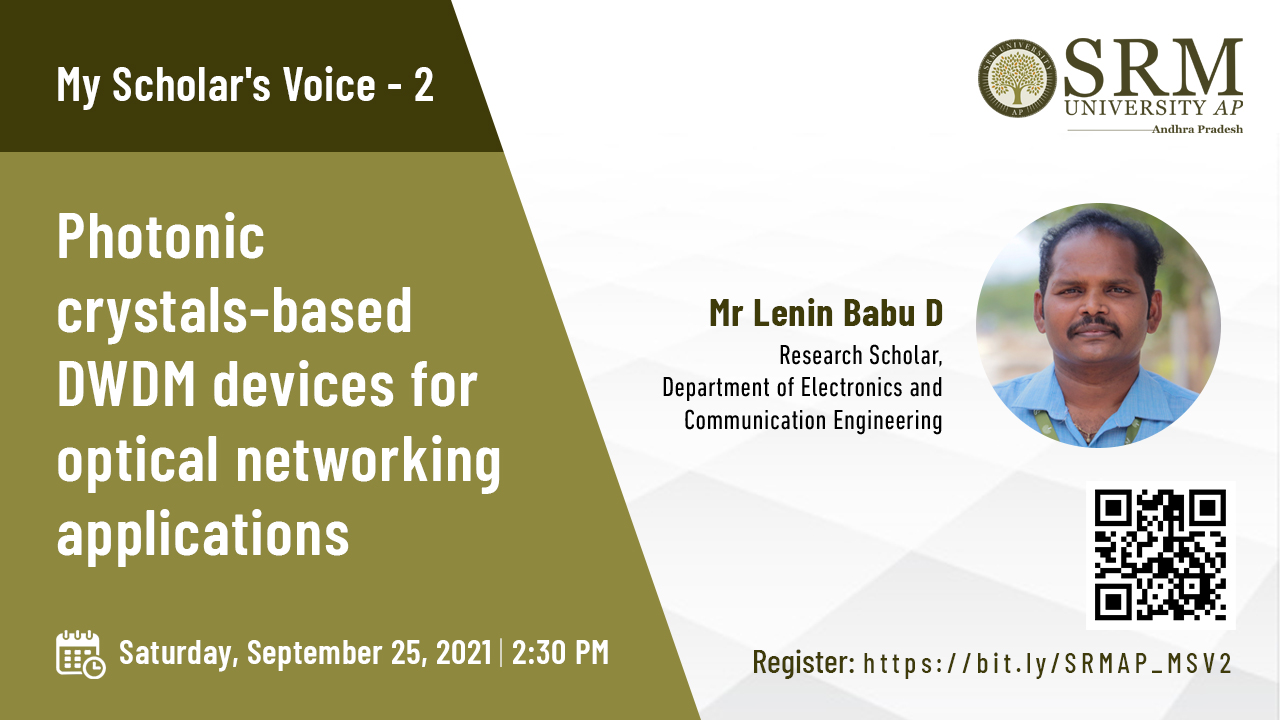 The research scholars from the Department of Electronics and Communication Engineering with great support and supervision from the faculty have planned to conduct their second Research Scholar’s Talk Series MSV-II on 25 September 2021 at 02:30 pm. Mr D Lenin Babu will engage the participants from 11:00 am to 12:00 pm with his enlightened talk on Photonic crystals-based DWDM devices for optical networking applications.
The research scholars from the Department of Electronics and Communication Engineering with great support and supervision from the faculty have planned to conduct their second Research Scholar’s Talk Series MSV-II on 25 September 2021 at 02:30 pm. Mr D Lenin Babu will engage the participants from 11:00 am to 12:00 pm with his enlightened talk on Photonic crystals-based DWDM devices for optical networking applications.
About the Speaker:
Mr D Lenin Babu is pursuing his PhD under the guidance of Dr Sreenivasulu (Department of ECE, SRM University-AP). He received his B Tech degree in ECE from JNTU Kakinada and received his MTech with specialization in Embedded systems from Vignan University in 2015. His research interests include integrated optical devices for optical communication systems. He is working towards his thesis titled “Photonic crystals based DWDM devices for optical networking applications”.
Join this engaging webinar on 25 September 2021, at 02.30 pm to learn more about photonic crystals-based DWDM devices for optical networking applications!
- Published in Departmental Events, ECE Events, Events, Research Events, Research Webinars
SRM University-AP develops sustainable transparent “biofilm” to replace plastic cuvettes
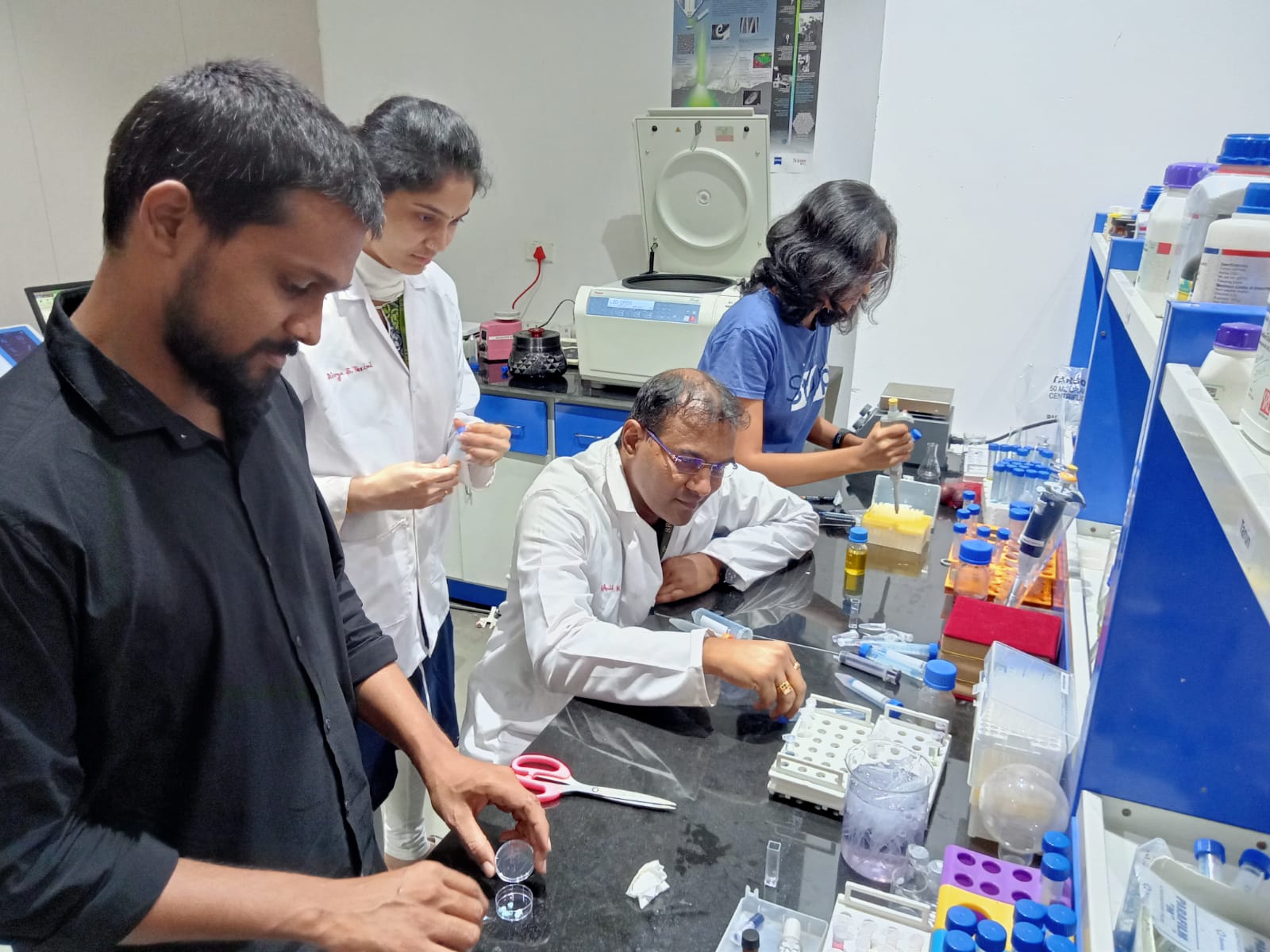 Dr Anil K Suresh, Associate Professor, Department of Biological Sciences, and his team from SRM University-AP recently developed a see-through transparent (with 85% above transmittance) biotemplate which they derived from the fish scale wastes to substitute the extensive usage of eco-unfriendly disposal plastic cuvettes for UV-Visible Spectroscopy measurements in the spectrum of 350-900 nm. UV-Vis spectroscopy is a versatile analytical tool used to examine the nature of various synthetic, biological and clinical molecules for pharmaceutical and environmental applications. The team members demonstrated the practical on-biotemplate analysis of diverse analytes such as DNA, proteins, nanoparticles, organic dyes, bacteria, BSA assay and dye-degradations.
Dr Anil K Suresh, Associate Professor, Department of Biological Sciences, and his team from SRM University-AP recently developed a see-through transparent (with 85% above transmittance) biotemplate which they derived from the fish scale wastes to substitute the extensive usage of eco-unfriendly disposal plastic cuvettes for UV-Visible Spectroscopy measurements in the spectrum of 350-900 nm. UV-Vis spectroscopy is a versatile analytical tool used to examine the nature of various synthetic, biological and clinical molecules for pharmaceutical and environmental applications. The team members demonstrated the practical on-biotemplate analysis of diverse analytes such as DNA, proteins, nanoparticles, organic dyes, bacteria, BSA assay and dye-degradations.
Dr Anil claims that the large-scale development of the biotemplate can resolve several issues in performing sustainable research; for instance, generates huge demand for fish scales as a resource stratagem otherwise causative of foul smell and disease propagation when discarded. Second, the use of non-biodegradable plastic cuvettes can be minimized for routine analytics and third, unlike plastic cuvettes that demand 500-fold analyte our biotemplate allows the analysis at a very low 10 microlitre volumes, making it feasible to analyse expensive, rare, and high-risk analytes. Dr Anil K Suresh owns the copyrights for this pathbreaking invention by being granted an Indian patent. This work is accepted for publication in the prestigious Journal of “Green Chemistry” by the Royal Society of Chemistry. Read the full paper here.
Adding to the mechanistic, Dr Anil said, “naturally acquired droplet retaining ability for over 30 minutes against gravity while vertically positioning the biotemplate supported such ultra-low volume measurements and monitoring of chemical reactions in-situ”. Interestingly, the same ability allows the retrieval of the analytes after completion of the analysis, crucial for precious analytes. Dr Anil says the best part is that the transparent biotemplate can be discarded back into the environment post-usage without any hesitation as the biotemplate is completely biodegradable.
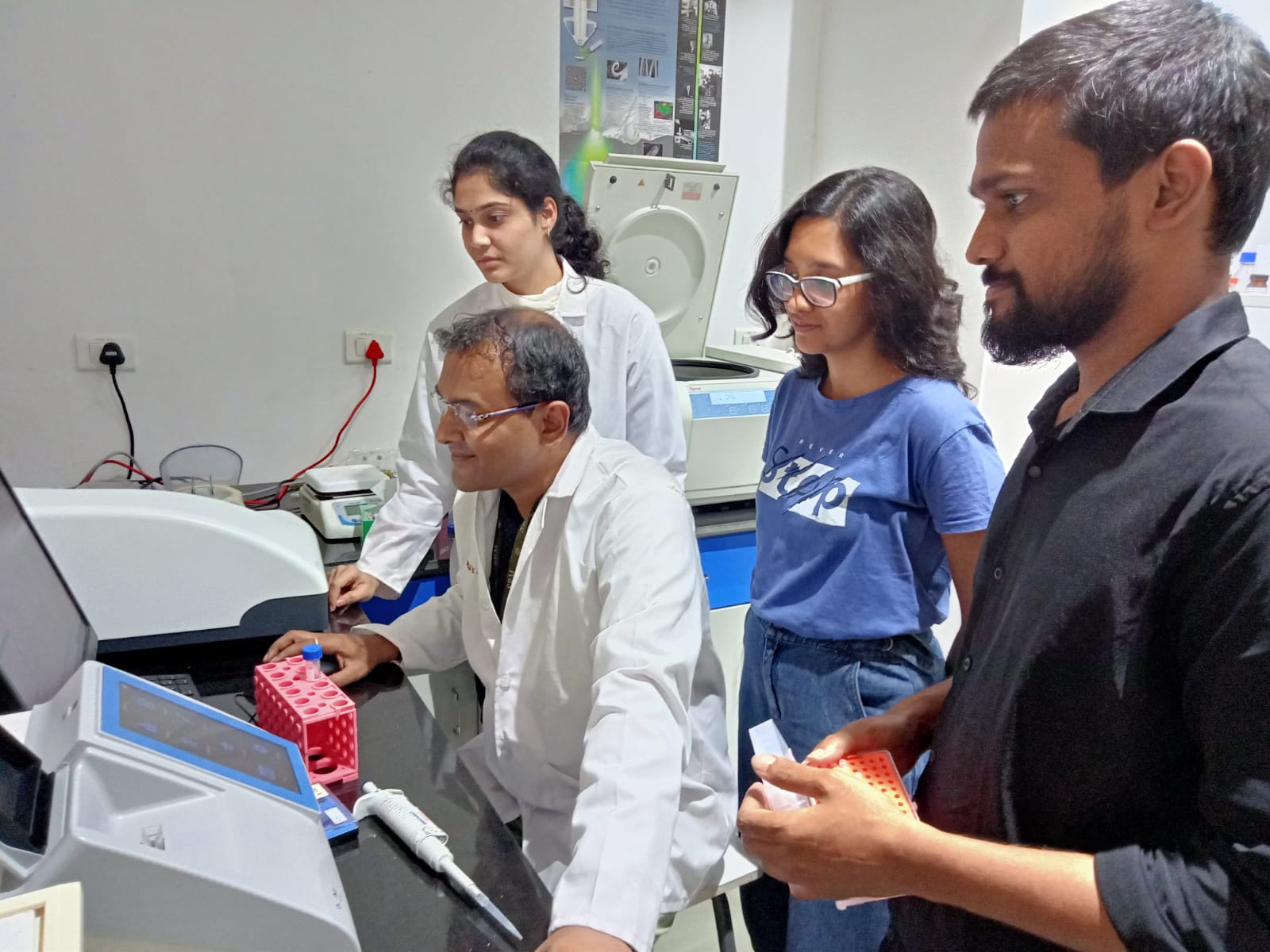
Further, the research group demonstrated ease in large-scale production by generating ~3000 bio templates at an affordable price. Dr Anil emphasised that this low-cost, plastic-free, use-and-throw biodegradable transparent biotemplate stemmed from food waste as a bioresource stratagem has huge potential in routine scientific and pharma UV-Vis analytics and he will very soon bring this product to the scientific community as a sustainable science solution.
Dr Anil Suresh concluded that this breakthrough conception would not have been possible without the rigorous efforts of his team and the continuous support from the university management, who are also encouraging and willing to support Dr Anil to establish his own start-up within the University. Dr Anil Suresh thanked his group members Ms Divya Parimi, Mr Chandra Bhatt, Mr Tharun Bollu and Ms Madhura, his collaborators Dr Malli and Mr Jacob. Dr Anil’s team especially thanked the management of SRM University-AP; the President Dr P. Sathyanarayanan for his generous support, Prof D Narayana Rao, Pro-Vice-Chancellor for his constant untiring encouragement, motivation and support in all his scientific endeavours, and the Vice-Chancellor Prof V S Rao for his kind support.
- Published in Biology News, Departmental News, News, Research News, Students Achievements
First patent granted to SRM University-AP
The Hawk – Sep 18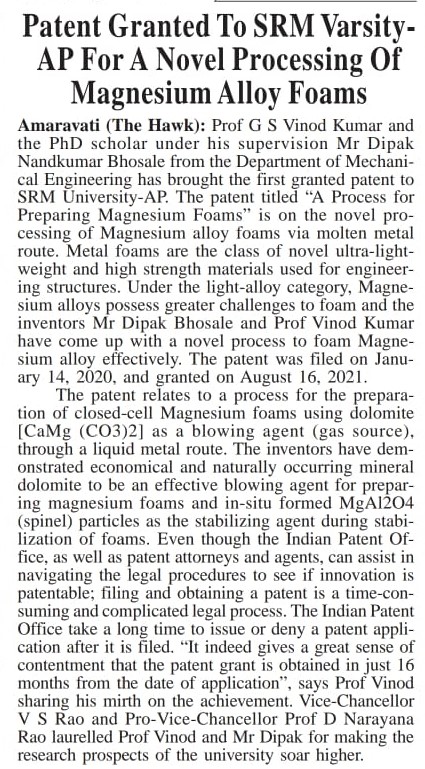
Sakshi – Sep 18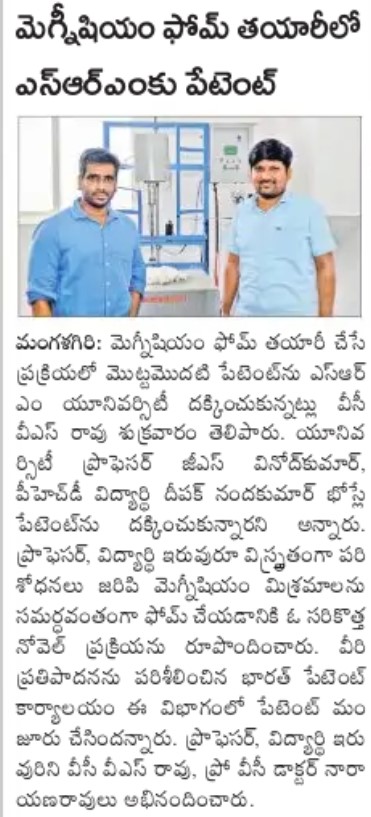
Manam – Sep 18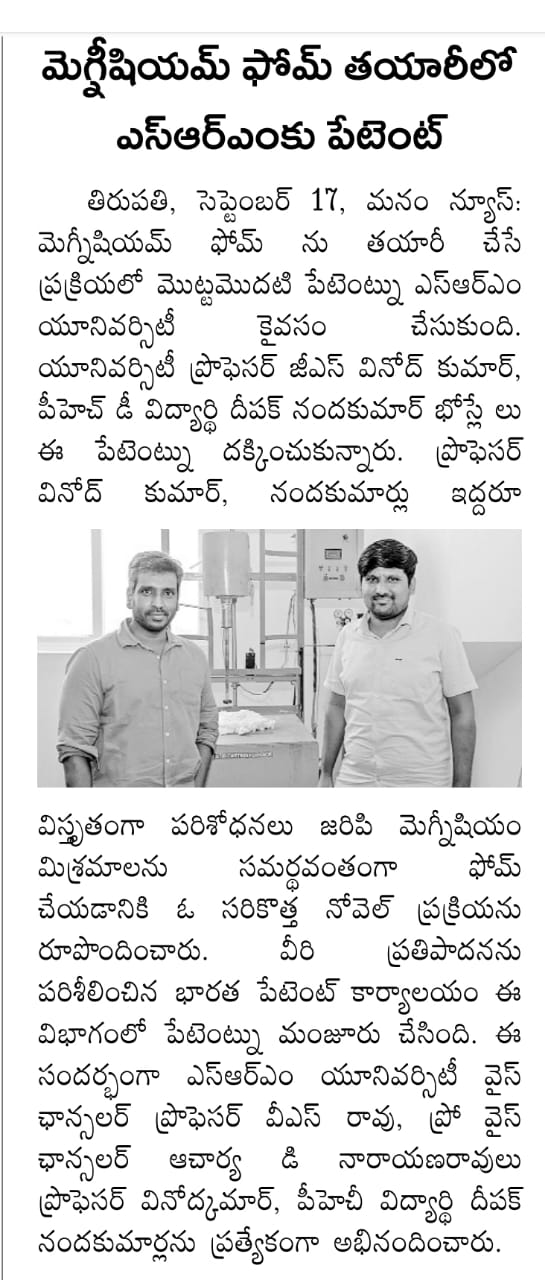
Vaartha – Sep 18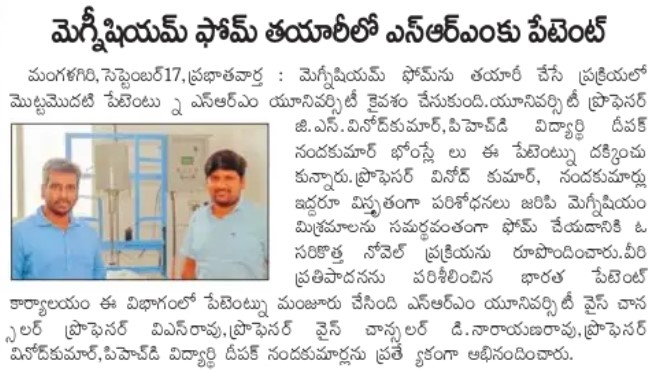
Vartha Prapancham – Sep 18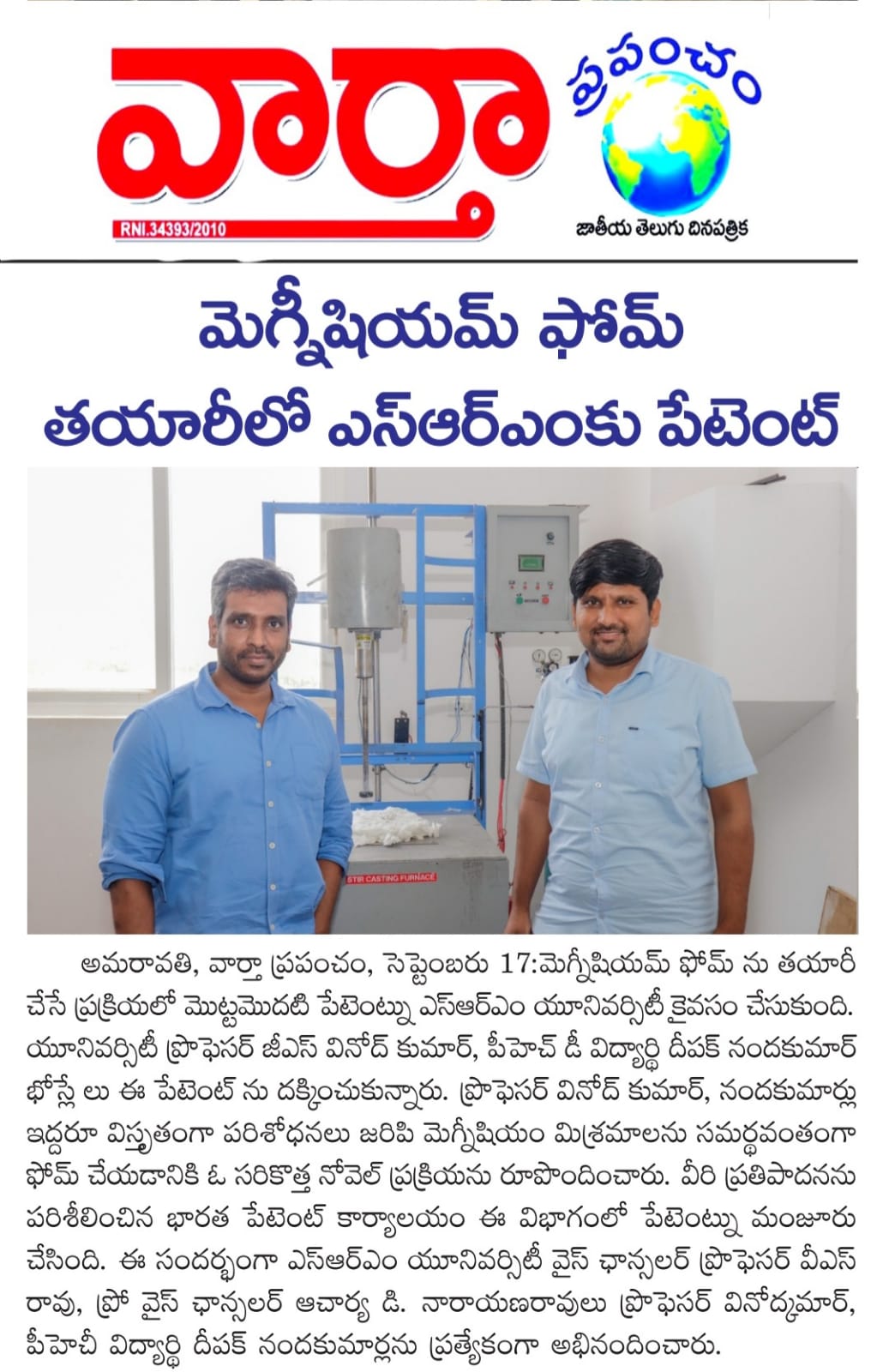
Visalaandhra – Sep 18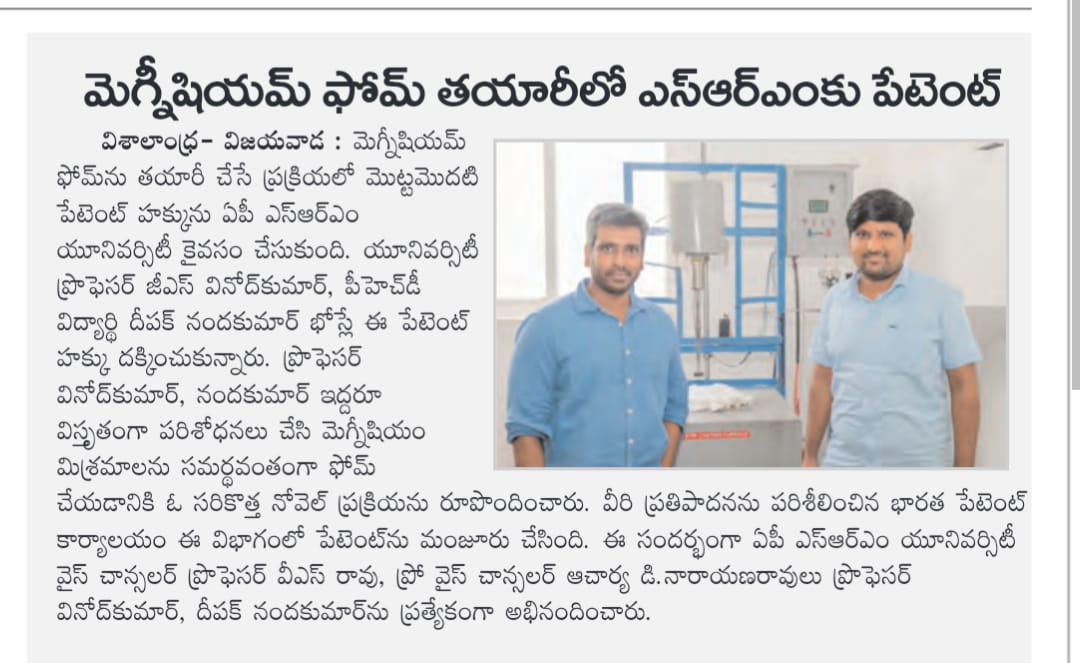
- Published in Newsroom


